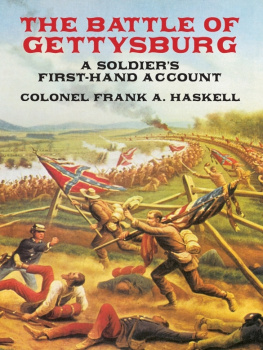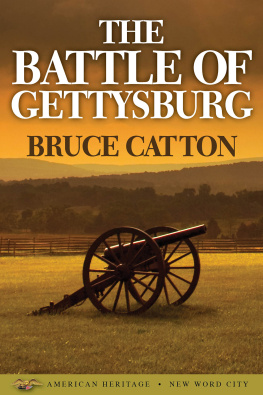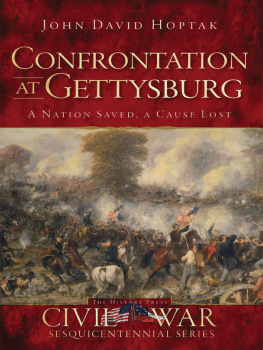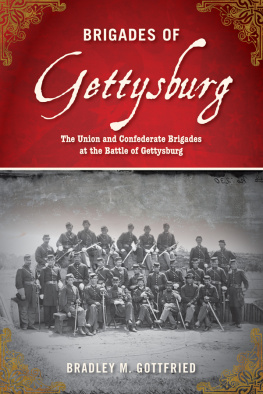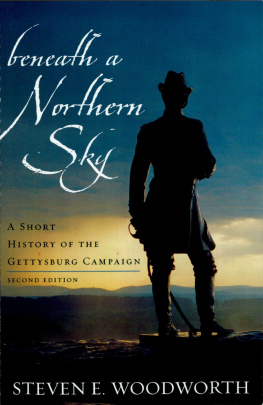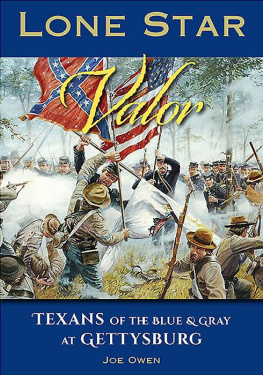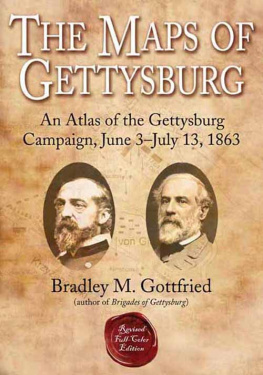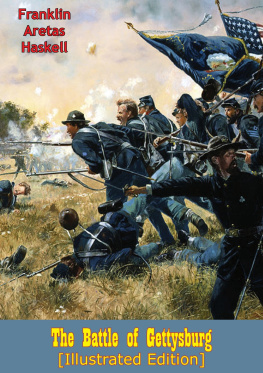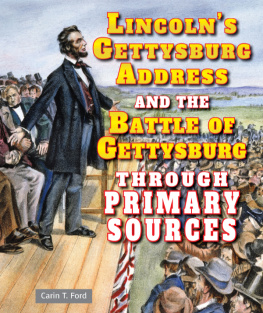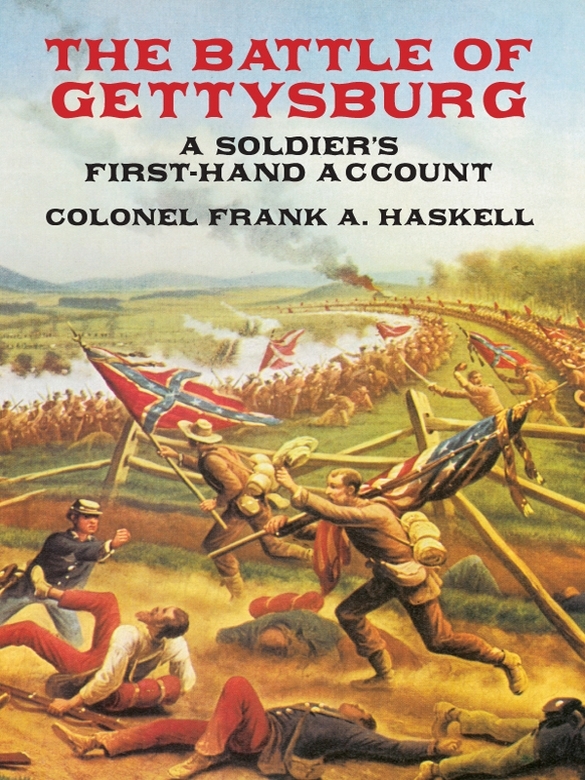THE BATTLE OF GETTYSBURG
T he great battle of Gettysburg is now an event of the past. The composition and strength of the armies, their leaders, the strategy, the tactics, the result, of that field are to-day by the side of those of Waterloomatters of history. A few days ago these things were otherwise. This great event did not so cast its shadow before, as to moderate the hot sunshine that streamed upon our preceding march, or to relieve our minds of all apprehension of the result of the second great Rebel invasion of the soil North of the Potomac.
No, not many days since, at times we were filled with fears and forebodings. The people of the country, I suppose, shared the anxieties of the army, somewhat in common with us, but they could not have felt them as keenly as we did. We were upon the immediate theatre of events, as they occurred from day to day, and were of them. We were the army whose province it should be to meet this invasion and repel it; on us was the immediate responsibility for results, most momentous for good or ill, as yet in the future. And so in addition to the solicitude of all good patriots, we felt that our own honor as men and as an army, as well as the safety of the Capitol and the country, were at stake.
And what if that invasion hould be successful, and in the coming battle, the Army of the Potomac should be overpowered? Would it not be? When our army was much larger than at presenthad rested all winterand, nearly perfect in all its departments and arrangements, was the most splendid army this continent ever saw, only a part of the Rebel force, which it now had to contend with, had defeated itits leader, ratherat Chancellorsville! Now the Rebel had his whole force assembled, he was flushed with recent victory, was arrogant in his career of unopposed invasion, at a favorable season of the year. His daring plans, made by no unskilled head, to transfer the war from his own to his enemies ground, were being successful. He had gone a days march from his front before Hooker moved, or was aware of his departure. Then, I believe, the army in general, both officers and men, had no confidence in Hooker, in either his honesty or ability.
Did they not charge him personally, with the defeat at Chancellorsville? Were they not still burning with indignation against him for that disgrace? And now, again under his leadership, they were marching against the enemy! And they knew of nothing, short of the providence of God, that could, or would, remove him. For many reasons, during the marches prior to the battle, we were anxious, and at times heavy at heart.
But the Army of the Potomac was no band of school girls. They were not the men likely to be crushed or utterly discouraged by any new circumstances in which they might find themselves placed. They had lost some battles, they had gained some. They knew what defeat was, and what was victory. But here is the greatest praise that I can bestow upon them, or upon any army: With the elation of victory, or the depression of defeat, amidst the hardest toils of the campaign, under unwelcome leadership, at all times, and under all circumstances, they were a reliable army still. The Army of the Potomac would do as it was told, always.
Well clothed, and well fedthere never could be any ground for complaint on these headsbut a mighty work was before them. Onward they movednight and day were blendedover many a weary mile, through dust, and through mud, in the broiling sunshine, in the flooding rain, over steeps, through defiles, across rivers, over last years battle fields, where the skeletons of our dead brethren, by hundreds, lay bare and bleaching, weary, without sleep for days, tormented with the newspapers, and their rumors, that the enemy was in Philadelphia, in Baltimore, in all places where he was not, yet these men could still be relied upon, I believe, when the day of conflict should come. Haec olim meminisse juvabit. We did not then know this. I mention them now, that you may see that in those times we had several matters to think about, and to do, that were not as pleasant as sleeping upon a bank of violets in the shade.
In moving from near Falmouth, Va., the army was formed in several columns, and took several roads. The Second Corps, the rear of the whole, was the last to move, and left Falmouth at daybreak, on the 15th of June, and pursued its march through Aquia, Dumfries, Wolf Run Shoales, Centerville, Gainesville, Thoroughfare Gapthis last we left on the 25th, marching back to Haymarket, where we had a skirmish with the cavalry and horse artillery of the enemyGum Spring, crossing the Potomac at Edwards Ferry, thence through Poolesville, Frederick, Liberty, and Union Town. We marched from near Frederick to Union Town, a distance of thirty-two miles, from eight oclock A.M. to nine P.M., on the 28th, and I think this is the longest march, accomplished in so short a time, by a corps during the war. On the 28th, while we were near this latter place, we breathed a full breath of joy, and of hope. The Providence of God had been with uswe ought not to have doubted itGeneral Meade commanded the Army of the Potomac.
Not a favorable time, one would be apt to suppose, to change the General of a large army, on the eve of battle, the result of which might be to destroy the Government and country! But it should have been done long before. At all events, any change could not have been for the worse, and the Administration, therefore, hazarded little, in making it now. From this moment my own mind was easy concerning results. I now felt that we had a clear-headed, honest soldier, to command the army, who would do his best alwaysthat there would be no repetition of Chancellorsville. Meade was not as much known in the Army as many of the other corps commanders, but the officers who knew, all thought highly of him, a man of great modesty, with none of those qualities which are noisy and assuming, and hankering for cheap newspaper fame, not at all of the gallant Sickles stamp. I happened to know much of General Meadehe and General Gibbon had always been very intimate, and I had seen much of himI think my own notions concerning General Meade at this time, were shared quite generally by the army; at all events, all who knew him shared them.
By this time, by reports that were not mere rumors, we began to hear frequently of the enemy, and of his proximity. His cavalry was all about us, making little raids here and there, capturing now and then a few of our wagons, and stealing a good many horses, but doing us really the least amount possible of harm, for we were not by these means impeded at all, and his cavalry gave no information at all to Lee, that he could rely upon, of the movements of the Army of the Potomac. The Infantry of the enemy was at this time in the neighborhood of Hagerstown, Chambersburg, and some had been at Gettysburg, possibly were there now. Gettysburg was a point of strategic importance, a great many roads, some ten or twelve at least concentrating there, so the army could easily converge to, or, should a further march be necessary, diverge from this point. General Meade, therefore, resolved to try to seize Gettysburg, and accordingly gave the necessary orders for the concentration of his different columns there. Under the new auspices the army brightened, and moved on with a more elastic step towards the yet undefined field of conflict.
The 1st Corps, General Reynolds, already having the advance, was ordered to push forward rapidly, and take and hold the town, if he could. The rest of the Army would assemble to his support. Bufords Cavalry co-operated with this corps, and on the morning of the 1st of July found the enemy near Gettysburg and to the West, and promptly engaged him. The First Corps having bivouaced the night before, South of the town, came up rapidly to Bufords support, and immediately a sharp battle was opened with the advance of the enemy. The first Division Gen. Wadsworth was the first of the infantry to become engaged, but the other two, commanded respectively by Generals Robinson and Doubleday, were close at hand, and forming the line of battle to the West and North-west of the town, at a mean distance of about a mile away, the battle continued for some hours, with various success, which was on the whole with us until near noon. At this time a lull occurred, which was occupied, by both sides, in supervising and re-establishing the hastily formed lines of the morning. New Divisions of the enemy were constantly arriving and taking up positions, for this purpose marching in upon the various roads that terminate at the town, from the West and North. The position of the First Corps was then becoming perilous in the extreme, but it was improved a little before noon by the arrival upon the field of two Divisions of the Eleventh Corps (Gen. Howard), these Divisions commanded respectively by Generals Schurz and Barlow, who by order posted their commands to the right of the First Corps, with their right retired, forming an angle with the line of the First Corps. Between three and four oclock in the afternoon the enemy, now in overwhelming force, resumed the battle, with spirit. The portion of the Eleventh Corps making but feeble opposition to the advancing enemy, soon began to fall back.

